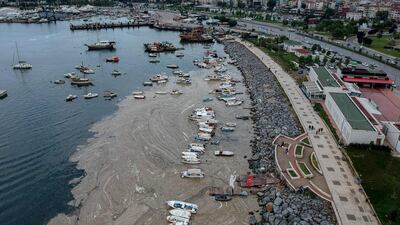Turkey's environment minister pledged on Sunday to defeat a plague of "sea snot" threatening the Sea of Marmara, promising a disaster management plan to secure the future of the inland sea.
A thick slimy layer of the organic matter known as marine mucilage – which is produced by microscopic algae – has spread through the Sea of Marmara south of Istanbul.
It poses a threat to marine life and the fishing industry.
President Recep Tayyip Erdogan blamed the outbreak on untreated water from cities including Istanbul – home to 16 million people – and vowed to "clear our seas from the mucilage scourge".
Harbours, shorelines and stretches of sea have been blanketed by the viscous, greyish substance, some of which has also sunk below the waves, suffocating life on the seabed.
"Hopefully, together we will protect our Marmara within the framework of a disaster management plan," Environment Minister Murat Kurum said aboard a marine research vessel which has been taking samples of the slimy substance.
"We will take all the necessary steps within three years and realise the projects that will save not only the present but also the future together," Mr Kurum said.
The naturally occurring mucilage was first documented in Turkey in 2007, when it was also seen in parts of the Aegean Sea near Greece.
But this outbreak is the largest on record, blamed by experts on a combination of pollution and global warming, which speeds up the growth of algae responsible for the slimy sludge.
"Of course it affects our work," fisherman Mahsum Daga, 42, said.
"You know what it does to shellfish? When they open up, it prevents them from closing up again because it gets in the way. All the sea snails here are dead."
Istanbul University biology professor Muharrem Balci said when the algae grow out of control in springtime, as they have done this year, they block out the sun and cause oxygen depletion for fish and marine life.
The "sea snot" results from a sort of nutrient overload for the algae, which feast on warm weather and water pollution that has grown progressively worse in the past 40 years, Mr Balci said.
"This mucilage is now covering the sea surface like a tent canvas," he said.
"After a while, this cover collapses to the bottom and covers the [sea floor's] ecosystem."
The Sea of Marmara, which stretches along Istanbul's southern coast from the Bosphorus to the Aegean Sea, is densely populated and home to numerous industrial sites.
Mr Balci said it also absorbs some of the waste that flows into the neighbouring Black Sea from the polluted Danube that cuts across eastern Europe.
"This is an extra burden for the Sea of Marmara," he said, and called for a collective action plan for all of the sea's coastal cities.
Workers are trying to remove the sludge with nets, but their efforts have so far proven largely ineffective.
Mr Balci said a lasting solution would require proper marine supervision, as well as biological and chemical disposal systems for coastal cities and industrial zones.








